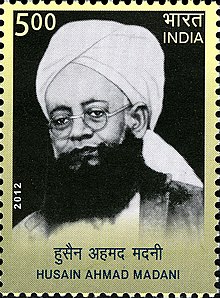
Back حسين أحمد المدني Arabic حسين احمد المدنى ARZ হুসাইন আহমদ মাদানি Bengali/Bangla Husain Ahmad Madani German Hussain Ahmed Madani French हुसैन अहमद मदनी Hindi حسین احمد مدنی Kashmiri ഹുസൈൻ അഹ്മദ് മദനി Malayalam حسین احمد مدنی PNB حسين احمد مدني Pashto/Pushto
Shaykh al-Islam, Mawlana Hussain Ahmad Madani | |
|---|---|
 | |
| 5th Principal of Darul Uloom Deoband | |
| In office 1927 – 5 December 1957 | |
| Preceded by | Anwar Shah Kashmiri |
| Succeeded by |
|
| 4th President of Jamiat Ulama-e-Hind | |
| In office 1940 – 5 December 1957 | |
| Preceded by | Kifayatullah Dehlawi |
| Succeeded by | Ahmad Saeed Dehlavi[1] |
| Personal | |
| Born | 6 October 1879 |
| Died | 5 December 1957 (aged 78) |
| Religion | Islam |
| Children | Asad Madni, Arshad Madani, Asjad Madani |
| Denomination | Sunni |
| Jurisprudence | Hanafi |
| Creed | Maturidi |
| Movement | Deobandi |
| Main interest(s) | Hadith, Tafsir, Fiqh |
| Notable idea(s) | Composite nationalism |
| Notable work(s) | Naqsh-e-Hayat |
| Alma mater | Darul Uloom Deoband |
| Tariqa | Chishti (Sabiri-Imdadi) Naqshbandi Qadri Suhrawardy |
| Muslim leader | |
Influenced by | |
Influenced | |
Hussain Ahmad Madani (6 October 1879 – 5 December 1957) was an Indian Islamic scholar, serving as the principal of Darul Uloom Deoband. He was among the first recipients of the civilian honour of Padma Bhushan in 1954.[2][3]
Madani played a key role in cementing the Congress-Khilafat Pact in the 1920s and "Through a series of lectures and pamphlets during the 1920s and 1930s, Madani prepared the ground for the cooperation of the Indian Ulama with the Indian National Congress."[4]
His work Muttahida Qaumiyat Aur Islam was published in 1938 and advocated for a united country, in opposition to the partition of India.[5]
- ^ Salman Mansoorpuri (2014). Tehreek Azadi-e-Hind Mai Muslim Ulama aur Awaam ka Kirdar (in Urdu). Deoband: Deeni Kitab Ghar. p. 194.
- ^ "Padma Awards" (PDF). Ministry of Home Affairs, Government of India. 2015. Archived (PDF) from the original on 15 October 2015. Retrieved 19 July 2017.
- ^ The rise and fall of the Deoband movement, The Nation (newspaper), Published 27 June 2015, Retrieved 19 July 2017
- ^ Sikka, Sonia; Puri, Bindu; Beaman, Lori G. (2015). Living with Religious Diversity. Routledge. ISBN 9781317370994.
- ^ Peers, Douglas M.; Gooptu, Nandini (2017). India and the British Empire. Oxford University Press. ISBN 9780192513526.
Madani, head for several decades of the Deoband training centre for theologians, strongly supported Congress nationalism and the ideal of a 'composite nationalism' within an united India, which he thought would be more conducive to the spread and prosperity of his community over the entire subcontinent than any religious partition.
© MMXXIII Rich X Search. We shall prevail. All rights reserved. Rich X Search